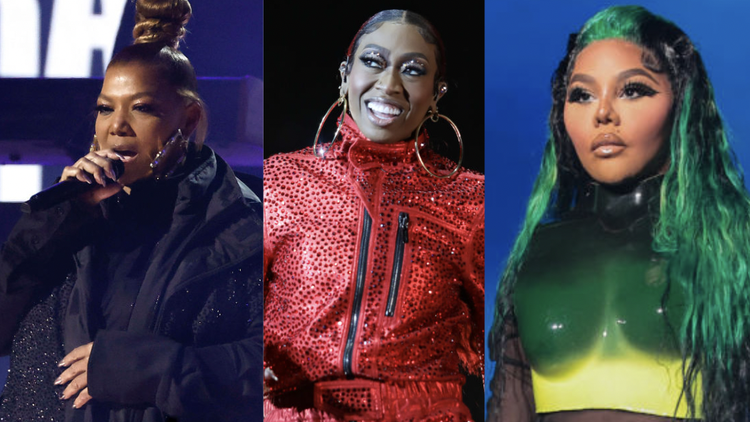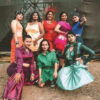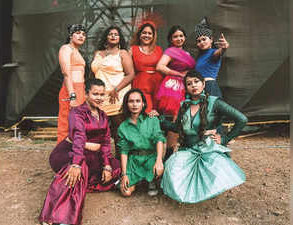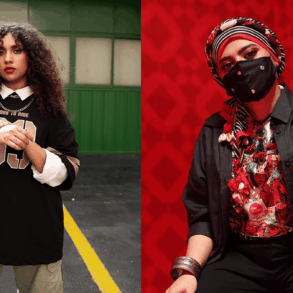Image

Image Credit
Frazer Harrison / Staff via Getty Images, Kaitlyn Morris / Contributor via Getty Images, and Prince Williams / Contributor via Getty Images
Image Alt
queen latifah, missy elliott, lil kim
Legend is the word that comes to mind when discussing the countless women who had enough courage to enter into the male-dominated hip hop industry and flip it on its head. Female rappers climbing to stardom and making themselves household names in the music industry is today’s commonality, but it wasn’t always the case for those starting out. For many, there were numerous trials and tribulations that had to be overcome for the level of respect and notoriety that we see them garner now.
Since the inception of hip hop, we’ve seen ladies become the voice for generations of women with lyrics that represented a variety of thoughts, feelings, and motivations. Whether it be about a break-up, making money or sexual experiences, these women told relatable stories and made sure to make their audience feel self-assured in the process.
While many up-and-coming artists make waves and extend the lineage of female rap, they have this list of women to thank for their contributions to the industry with confident rap styles, dynamic lyricism and perseverance. Check out our list of 20 top OG female rappers, in no particular order, below.
1. Queen Latifah
U-N-I-T-Y wasn’t the only positivity that Queen Latifah was spreading during her earlier career moments in the 1990s. The Newark-native made it a point to uplift Black women in her music by intentionally not referring to them b**tches or h**s, and supports of the next generation of female rap artists.
Latifah set the standard for multi-hyphenate women by building a successful career as an actress in the entertainment industry, becoming the face of Covergirl, and having her own syndicated talk show from 1999 to 2001 and again from 2013 to 2014. She is famously known for her roles in the movies Set It Off, Just Wright, Beauty Shop, Girls Trip, and as Khadijah in the hit TV sitcom “Living Single.” The legend also briefly put down her rhymes for harmonies and built a career singing soul music.
No matter what arena she was in, Latifah never lost her roots as a rap artist. For the “Ladies First” artist, it was never about looks, but about the message she was delivering to her audience.
2. MC Lyte
From being one of the first female hip hop connoisseurs to being the voice behind some of our favorite award show moments, MC Lyte has continued to have unparalleled charismatic flow and dynamic impact when it comes to the hip hop industry. Starting as a teenager to the woman we see wearing many hats today, it is astounding to see her growth. Her many hats include rapping, songwriting, deejaying, narrating, acting and more. The release of her first album, Lyte as a Rock, made the OG the first solo female rapper to release a studio album.
The years to follow would include high rapport among fans for her earlier projects, so much so that her sophomore album, Eyes On This, would make its way to the the Billboard 200 list. Lyte even helped to spearhead “I Am Woman: A Celebration of Women in Hip-Hop” in 2022 that specifically highlighted the contributions that various female rap artists have made to rap. While this was no easy feat, it’s safe to say that her passion for sisterhood still stands.
3. Salt-N-Pepa
Before Salt-N-Pepa came to be, female music groups were few and far between. Luckily for these Queen natives, they were able to push through adversity by becoming the first all-female rap group to emerge. They got their start after recording a song for a friend’s class project, and soon after got the track sent to a local radio station. Before they knew it, they were setting sail on one of their biggest life changes. With music that promoted independence and sexuality, they soon became a household name. Most notably known for their Very Necessary album and the notorious song “Push It” with DJ Spinderella, the group found themselves climbing the music charts fast.
Throughout their run in the music industry, they were also able to make history for having all recurring gold and platinum selling albums. Today, the ladies still perform their smash hits and reign as trailblazers in the music industry.
4. Lil’ Kim
Shall we proceed with all that Lil’ Kim has accomplished? Yes, indeed! Between dynamic fashion and erotic lyrics that only she could pull off, the Brooklyn artist was able to make a name for herself after initially starting in rap crew Junior M.A.F.I.A. under the direction of late rapper Biggie Smalls. Despite persistent rumors of her affairs outside of rap and the negativity surrounding her, the music was able to stay just as bold and hardcore as she was. Through musical storytelling and, in some cases, pouring her heart out on tracks, Lil’ Kim was able to convey in-depth emotion while still delivering on all the thoughts women had the idea to say or never thought of verbalizing in the bedroom.
Since her growth as an artist, she was also able to land guest starring roles on hit TV shows and movies. Appearances on “The Parkers,” “Moesha,” and You Got Served were all a playground for Lil’ Kim fans to get a sense of her acting style. Though in many of these roles she was playing herself, she was still able to channel her authenticity and rep for New York girls from beginning to end.
5. Missy Elliott
Being the first female rapper to be inducted into the Rock & Roll Hall of Fame, it is with no surprise that Missy Elliott has been able to blaze a unique trail for those coming after her. From futuristic music video aesthetics to no-holds-barred lyrics, Elliott was able to make herself stand out among other female rappers for taking a definitive approach to the industry.
The sexualization of female rappers caused for there to be a lack of respect for how some artists were treated. Elliott soon debunked this by stepping out of normalcy of how others rapped, danced, and portrayed themselves. Thanks to the artist who gave us Supa Dupa Fly, music was able to expand beyond its everyday humdrum and march to the beat of a new drum: Hers.
Elliott was able to persevere through her condition of Graves’ disease to be in the position she’s in today. She proudly stands tall in reflection of what she’s done, and still makes music for younger generations to enjoy.
6. Trina
Repping for the 305, Trina helped to pave the way for female rappers from the south who weren’t heavily prevalent at the time. Exuding the utmost confidence and sexual liberation throughout her songs was the road map for many female rappers, but Trina’s approach included gritty lyrics with a balance of southern realness. Songs like “Nann” and “Da Baddest B**tch” still blare through car speakers for how they resonate with women. Her work alongside Trick Daddy is what truly helped put Miami on the map.
Hip hop duo City Girls credits Trina the most for her influence on their rap careers and has even worked with her on their song called “I Just Wanna.” Trina has also paid it forward by supporting other female artists through features.
7. Eve
Known for her legendary blonde bob and paw-print tattoos, Eve got her start after signing with Dr. Dre under his label Aftermath Entertainment. Soon after, she was met with the decision to switch over to Ruff Ryders label, which included artists Jadakiss, Swizz Beatz, and DMX.
At a young age, Eve was able to hit the charts as a musical trendsetter, but was still faced many of the issues that other female rappers faced: misogyny and misunderstanding. The Philly native was able to garner traction with the release of her single “What Ya Want” and was marketed by the label as their “first lady” giving her even more prominence.
Alongside Gwen Stefani in “Let Me Blow Ya Mind,” Eve was able to receive a Grammy in 2002 for Best Melodic Rap Performance. As she began to slow down on creating music, she was able to pick up acting and had her own TV sitcom called “Eve” from 2003 to 2006. She also had a recurring role in the hit movie Barbershop, which became a three-part franchise.
8. Foxy Brown
The continuation of female rappers from New York intensified when Foxy Brown stepped on the scene. The explicit lyricist erupted the industry with more representation for women of darker tones to have the spotlight. While this may have posed controversy for many, Foxy continued to stand her ground and make traction for sex positive lyrics with a confident approach in her music.
Alongside JAY-Z, she was able to deliver hits like “Ill Na Na,” “Big Bad Mama,” and “I’ll Be” throughout the late 1990s and early 2000s. Foxy has inspired the next generation of rappers by showing them that they too can be just as successful.
9. Remy Ma
Being “conceited” was not the only reason for rap star Remy Ma’s fame. Growing up in the Bronx, she was able to immerse herself in rap culture before joining Fat Joe’s rap crew, Terror Squad. Like many of the artists on this list, she too was able to set herself apart in a predominantly male environment.
Not soon after being signed to the same label as Fat Joe, Street Records Corporation, Remy was reaping the benefits of her contribution to the group’s song “Lean Back.” The song not only helped to score the artist a Grammy nomination, but also made its way up various Billboard charts including the Hot R&B/Hip Hop Singles & Tracks and the Hot 100.
Though she served time in prison, Remy did not allow this to stop her from continuing her impact in the rap game. Shortly after being released in the fall of 2014, she was making her way to the studio and laying verses. This led to the hits we listen to today like “All The Way Up,” “Melanin Magic,” and the infamous “Shether” diss. Remy was even able to share more of her personal life on the reality TV show, “Love & Hip Hop: New York” beginning just a year after her release. This helped fans to see her journey from her eyes.
10. Da Brat
Chicago definitely looked out once Da Brat stepped foot on the scene. Rap duo Kriss Kross first discovered her alongside Jermaine Dupri after she entered and won a local rap contest for Yo MTV Raps. Soon after, she began her career after signing to So So Def in 1992.
Her freshman album, Funkdafied, soared the charts after selling one million copies. This also made the release go platinum, promoting the hip hop songstress to being the first female rapper to receive the honor. In her early 20s, Brat was already making headlines as the latest and greatest there was in her era, putting her in rankings with stars like Salt-N-Pepa and Yo-Yo.
With braggadocious lyrics and presenting more street-style outfits, the “That’s What I’m Looking For” artist was able to break the norm that was growing around female rappers. Da Brat has not only strongly represented for Black female rap artists, but also represented for the LGBTQ+ community after publicly sharing her relationship and expanded family in recent years. Today, she has transitioned to a career in radio opposite of comedian Rickey Smiley on “The Rickey Smiling Morning Show.”
11. Rapsody
Sometimes all it takes is one shot to soar beyond your wildest dreams. For Grammy-nominated rap star Rapsody, this would only be a piece of her story as an artist in the hip hop industry. In the early 2000s, she was afforded the opportunity to work with renowned producer 9th Wonder and even laid down verses for him over remastered samples for his album The Dream Merchant Vol. 2.
Starting her solo career under the producer afforded her the opportunity to showcase her skills on features and songs solely from her. Eventually, Rapsody would blaze a new path by signing to JAY-Z’s Roc Nation and attaining two Grammy nominations.
The North Carolina native’s tertiary album, Eve, specifically highlighted the strides that Black women have been able to make. The 2019 album encompassed numerous references to women — both from older and newer — generations that evoke inspiration and discovery of self.
12. Lauryn Hill
Fugees’ Lauryn Hill will always remind everyone of the versatility there is to her art. During her time in the group, she was able to feature her lyricism and melodic voice on their debut album, The Score, in 1996 on tracks like “Killing Me Softly” and “Ready or Not.” After over 18 million copies were sold, the group scored a Grammy for Best Rap Album in 1997. It wouldn’t be too long before Hill would begin her solo career. Independently, she also made history as the first female hip hop artist to win the Grammy for Best New Artist in 1999.
After her time in the group, Lauryn set her sights on her singing career and morphed her catalog to encompass both rap and singing. This was shown most prevalently in her 1998 album, The Miseducation of Lauryn Hill.
This project embodied transparency, relatability, and a fresher approach on so many topics that weren’t being discussed as much in mainstream media. Through addressing topics like relationships, faith and the shared experience of Black people, fans were able to have an intellectual music experience that they could still dance to. Over 20 years later, she continues to be one of the anchors in female rap history.
13. Roxanne Shanté
Extending the lineage of New York female rappers, Roxanne Shanté emerged at the age of 14, and took the industry by storm. Rapping freestyle over complex hip hop beats over the radio live opened her to a mix of reviews. Whether positive or negative, Shanté decided to push forward and give unapologetic rhymes for the world to hear. The Ol’ Skool Flava of Nia artist also was a part of the early days of a group called Juice Crew, which helped not only herself but Biz Markie and MC Shan launch their careers in hip hop.
More notable for speaking her mind on diss tracks, she was able to evoke a new style of rap. “Roxanne’s Revenge” set a standard of lyrical word play beyond cookie-cutter standards, showing that men weren’t the only ones who could go toe to toe. A Netflix biopic called Roxanne, Roxanne was even released in 2018 to share more of her journey in the music industry and the struggles that came with being so young while trying to be taken seriously.
14. The Lady of Rage
Sporting her natural hair in two Afro puffs and a pervasive demeanor, The Lady of Rage joined the lineup of female rappers in the early 1990s. Under the leadership of Dr. Dre, she was able to gain notoriety for her unique rap flow and being featured on numerous tracks before garnering her own solo album in 1997.
Necessary Roughness was an album of funky beats and well constructed wordplay. The project was so popular that it was able to make its way to the Billboard 200 list. From there, the rapper shifted to Death Row Records and was able to keep her impact of being one of the only women in an all-male crew.
Though she put a pause on her rap career, The Lady of Rage’s impact shifted as she began to pursue acting. She was even able to create a cultural reset in her role as Baby D on the hit movie series, Friday alongside fellow rapper Ice Cube and comedian Chris Tucker. She also played the role of Coretta Cox on “The Steve Harvey Show.”
15. Left Eye
Musical groups have always been tricky in the industry, but for TLC’s Left Eye, it was always a matter of keeping her girls close and pushing through life’s adversities to continue her art. Hit songs like “Waterfalls,” “Diggin’ On You,” and “What About Your Friends?” are all still timeless songs that get played on radio stations across the country. Left Eye initially got her start after transitioning from dance to rap and relocating to Atlanta from Philadelphia to join a female group at the time called 2nd Nature.
After many internal changes and differences, she soon found herself being introduced to fellow emerging musicians T-Boz and Chilli to create the group we know and love today: TLC. The group is predominantly known for their chart stopping album, CrazySexyCool, which housed three of their greatest hits and sold millions of copies, which landed them on the Billboard Hot 100 list for weeks on end.
After taking a long break from the industry, Left Eye was able to pick up where she left off with her fellow group members and create the beloved album, FanMail. Though she passed away in 2002, Left Eye’s name still has prevalence today as her lyrics and legacy protrude through her powerful words on tracks.
16. Amil
In the late 1990s, you were more than likely going to hear hip hop artist Amil’s voice paired with fellow New York rapper JAY-Z. After signing to his label at the time, Roc-A-Fella Records, fans were able to soon realize her talent of creative rhymes and skillful lyricism. Joining the label also made her the first female to do so, which was a statement in and of itself.
Songs like “I Got That” and “N**ga What, N**ga Who” were where she was able to grow in exposure as an emerging artist, and show her versatility. Amil also had the opportunity to work with Ja Rule on the song “Can I Get A…” for the film Rush Hour in 1998. Though she decided to leave the industry after releasing more music, the talent’s impact of representing women in a male-dominated arena remains strong.
17. Rah Digga
Looking to create her own path while being inspired by the rappers before her, Rah Digga was able to rise to stardom after joining rap crew Flipmode Squad under the leadership of Busta Rhymes. She was actually discovered for her lyricism while pregnant. Launching a rap career and starting motherhood is something that can surely be an uphill battle, but Digga was able to put her pride aside and push forward.
Her career jump started with her 2000 release of the album, Dirty Harriet, which opened the door wide for more opportunity. From there, she proceeded to release “Imperial,” “Tight,” and was even featured on the remix of “Touch It” with all-female rappers. Her story proves that you can pursue your dreams even when things get difficult.
18. Yo-Yo
Pioneering the rap game alongside many of the greats on this list, Yo-Yo set sail on her career in hip hop after beginning to work under Ice Cube in 1990. Representing the West Coast, she was able to bring a unique approach to the industry as many female rappers came from the east or south.
Yo-Yo has made it a point to uplift women throughout her music and remind them of their worth. A strong example of this was her feature on the hit R&B remix of “I Wanna Be Down” alongside Brandy, MC Lyte, and Queen Latifah in 2004. She has continued to uplift the female rappers of today like Nicki Minaj and Cardi B, as well.
Despite facing label issues and personal changes, like many other female rap stars, she was able to double her career in entertainment through acting with roles in movies like Menace II Society and Boyz n the Hood. She has also created her own school for emerging artists called the YoYo School of Hip-Hop, which is located in Los Angeles.
19. Charli Baltimore
Murder Inc. created history when adding none other than rap songstress Charli Baltimore to their roster. Working with artists like Ja Rule, Cam’ron, and even JAY-Z helped her get in her bag more. She initially was discovered by New York native Biggie Smalls in 1995. Through captivating storytelling and crafty lyrics, Baltimore made strong rapport among fans.
In 1999, she debuted her first album titled Cold as Ice and was able to build a name for herself with songs like “Pull The Alarm” and “Keep It Real.” After taking a hiatus from the rap game, she returned with a vengeance with her mixtape release, True Lies, in 2010. The MC’s most notable feature with Ja Rule, “Down A** B**tch,” still holds weight and was ranked on numerous Billboard charts including Hot 100, Hot R&B/Hip Hop Songs, Hot Rap Songs, and Rhythmix. She was even a cast member on “Growing Up Hip Hop” with her daughter to showcase their journey.
20. Gangsta Boo
Gangsta Boo was introduced to the hip hop industry under Three 6 Mafia. The Memphis native was able to standout while in the group, but she also made her mark as the first female rapper in the crew. After the release of the song “Mystic Stylez,” it was clear to see that the rapper was going to be unstoppable. With penetrative lyrics and a “respond now, ask questions later” approach to her music, listeners got a boost of confidence from listening to her music.
Similar to other female rappers, Gangsta Boo also extended an olive branch and provided support for younger women following in her footsteps. Though she passed away in 2023, fans still remember her as one of the blueprints for lyrical cadence and unapologetic energy.
This post was originally published on this site be sure to check out more of their content.






